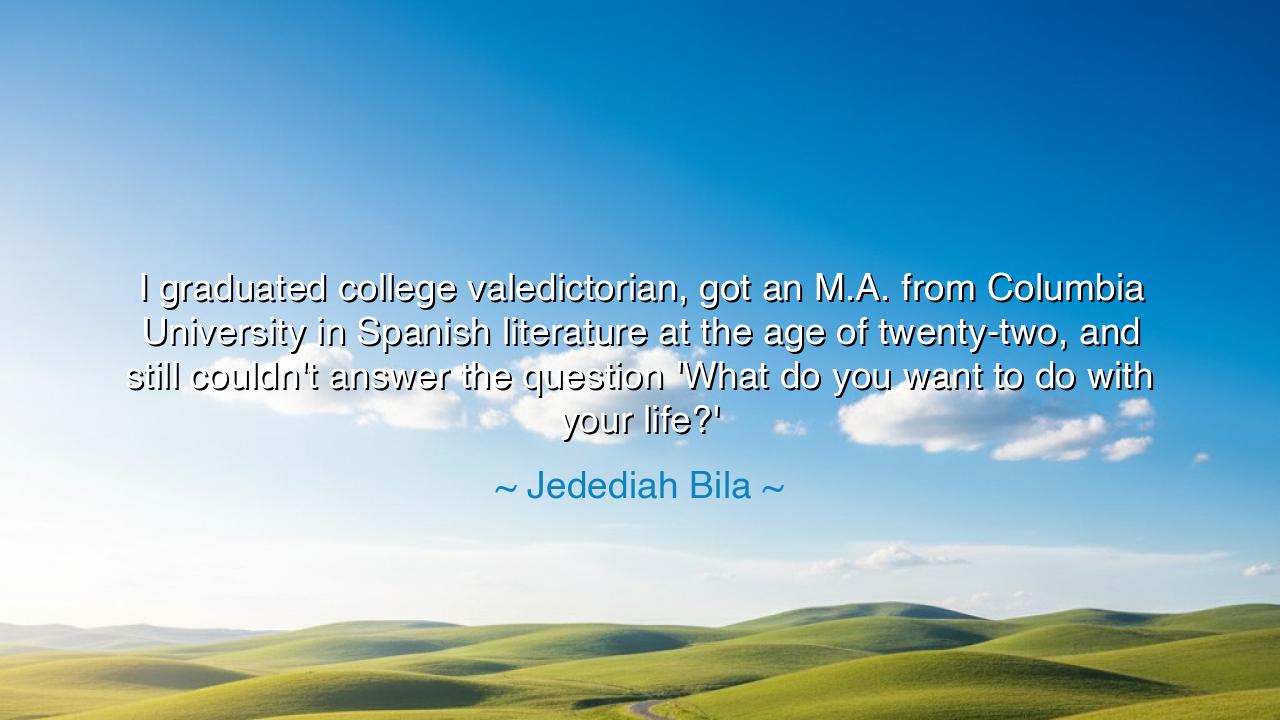
I graduated college valedictorian, got an M.A. from Columbia
I graduated college valedictorian, got an M.A. from Columbia University in Spanish literature at the age of twenty-two, and still couldn't answer the question 'What do you want to do with your life?'






"I graduated college valedictorian, got an M.A. from Columbia University in Spanish literature at the age of twenty-two, and still couldn't answer the question 'What do you want to do with your life?'" These words by Jedediah Bila speak to a profound truth about the human experience—the pursuit of knowledge and achievement does not always lead to clarity or fulfillment. Despite excelling in academia, she found herself standing at the crossroads of life, confronted by the weighty question that often eludes even the most accomplished among us: What is the purpose of my life? This question, though seemingly simple, is one that has haunted the greatest minds throughout history, for it is not merely about what one does, but who one becomes in the process.
Bila's experience is not unique. Many of us, when we set out to conquer the world through education, career, and status, expect that these accomplishments will bring us not just respect, but an answer to the larger questions of existence. We fill our minds with facts and our lives with goals, believing that success in one area will lead to success in all others. Yet, as Bila so candidly reveals, intellectual achievement does not always equate to life clarity. In fact, it often leaves us feeling more uncertain, as we struggle to reconcile what we’ve been taught with the deeper truths of our own desires and values.
Consider the life of Socrates, whose wisdom has transcended the ages, yet who spent his life seeking answers to questions that eluded him. Socrates famously declared that "the unexamined life is not worth living," yet he himself was often at a loss for the answers to life's biggest questions. His journey was not one of acquiring knowledge in the traditional sense, but of constantly questioning, probing, and reflecting on the nature of existence. Like Bila, Socrates found that answers were not always found in degrees or accolades, but in the pursuit of understanding and the acceptance of uncertainty. His life teaches us that the search for meaning is often more valuable than the discovery of definitive answers.
Bila’s struggle with the question of "What do you want to do with your life?" also reflects a deep and timeless paradox: the more we learn, the more we realize how little we know. As knowledge expands, so too does the awareness of its limitations. This is akin to the wisdom of the great King Solomon, who, despite his vast knowledge and wealth, questioned the meaning of life itself. In the Book of Ecclesiastes, Solomon famously wrote, “Vanity of vanities, all is vanity.” His words speak to the inherent uncertainty that comes with life’s pursuit—no amount of material success or intellectual achievement can provide the ultimate answer to the question of existence. Solomon’s conclusion, however, was not despair, but a call to live with humility, to embrace life's fleeting nature, and to seek meaning in simpler things—relationships, purpose, and wisdom.
The key lesson here is that purpose is not something that can be neatly defined through a checklist of accomplishments. While academic success and professional milestones can bring a sense of pride, they do not necessarily lead to fulfillment or the clarity we seek in life. True meaning often emerges when we step away from rigid definitions of success and embrace the process of discovery. Like Bila, we must be open to the possibility that the journey itself—rather than any destination—may hold the answers to the larger questions we face. Purpose is not always something we find in a degree or a career, but in the ways we grow and evolve as individuals.
In practical terms, the lesson we can draw from Bila's reflection is to embrace the uncertainty that comes with being human. Instead of focusing solely on what we do, we must focus on who we are becoming. It is not necessary to have all the answers at a young age, nor is it even desirable. The greatest minds, from Socrates to Solomon, were shaped not by their certainty, but by their willingness to ask questions, to embrace ambiguity, and to seek meaning through self-reflection and life experience. Let us approach life with the understanding that clarity may come in time, but that the pursuit itself is what shapes us.
Finally, as we consider our own lives, we must remember that the search for purpose is not a race or a destination, but a journey. Like Bila, we may find ourselves with more questions than answers, and that is okay. In fact, it is a sign of growth—a testament to our willingness to challenge the narratives that society tells us about success, and to forge our own path. As we walk this path, let us do so with patience, self-compassion, and the understanding that the answer to life’s biggest questions may not be a singular moment of clarity, but a series of evolving realizations that unfold over time.
In conclusion, Jedediah Bila’s reflection serves as a timeless reminder that life’s purpose is not always found in degrees, accolades, or achievements. It is found in the questions we ask, the uncertainty we embrace, and the growth that comes from the pursuit of understanding. Let us not rush to define ourselves by the benchmarks set by others, but instead, focus on the journey of becoming—learning, evolving, and finding meaning in the process itself. The answers will come in time, but they are not the ultimate goal; it is the questions, the search, and the evolution of the self that truly define us.






AAdministratorAdministrator
Welcome, honored guests. Please leave a comment, we will respond soon